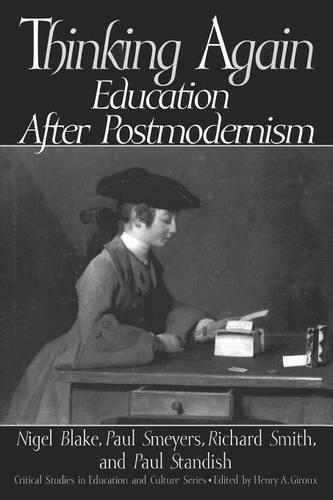
Thinking Again: Education After Postmodernism
(Paperback)
Available Formats
Publishing Details
Thinking Again: Education After Postmodernism
By (Author) Nigel P. Blake
By (author) Paul Smeyers
By (author) Richard Smith
By (author) Paul Standish
Bloomsbury Publishing PLC
Praeger Publishers Inc
8th April 1998
United States
Classifications
Tertiary Education
Non Fiction
370.1
Physical Properties
Paperback
224
Width 156mm, Height 235mm
340g
Description
The 'postmodern condition,' in which instrumentalism usurps all other considerations, has produced a kind of intellectual paralysis in the world of education. It is difficult to take issue with such shibboleths of our time as 'standards', 'effectiveness' or 'quality', or the transmission of a nation's 'heritage', yet many people sense that important values are being lost as the education systems of the developed world increasingly devote themselves to managerialism and 'performativity', the quest for efficiency and effectiveness that can be quantified. This book shows how a sustained and telling critique of current educational policy and practice can be developed from the writings of such postmodern thinkers as Lyotard, Derrida, Foucault, and Lacan. These thinkers show us new directions, making what has become over-familiar in education seem strange, and they shake us out of established ways of thinking and writing. The book reveals how very different certain aspects of educationfor instance, literacy, moral education (in the home as well as the school), curriculum policy and planninglook in the light of these ideas. The book makes many of the central ideas of postmodern theory accessible by demonstrating their relevance to familiar aspects of the practice of education.
Reviews
"[A] thoroughly engrossing book that scholars and teachers will profit from reading, including those -- perhaps especially those -- who have regarded postmoderism with disdain and incomprehension."-Eamonn Callan, Professor of Educational Policy Studies University of Alberta
"Rereading philosophical and literary sources in a perceptive and engaging style, the authors offer sharp critical insights while also broadening our sense of educational possibilities."-Nicholas Burbules, Professor of Educational Policy Studies University of Illinois, Urbana/Champaign
"What I find most interesting is that the authors treat their main chosen poststructuralists as continuing and contributing to [the] traditional Anglo-American philosophy of education in a non-relativistic manner, rather than opposing it, which many Nietzschean based interpretations of these poststructuralists might suggest. This makes the book an important contribution to [the] philosophy of education in itself."-Jim Marshall, Professor of Education and Dean of the Faculty of Arts University of Auckland
[T]he whole text with its rich, readable, rhetorical mix of exposition, argument, jokes, and ironies.-British Journal of Educational Studies
Full of philosophical, spiritual, metaphysical and Shakespearean references, this book is for the serious student of educational theory and philosophy. It is of equal interest to the serious reader of sociological and historical studies.-Education Libraries
"The whole text with its rich, readable, rhetorical mix of exposition, argument, jokes, and ironies."-British Journal of Educational Studies
"[T]he whole text with its rich, readable, rhetorical mix of exposition, argument, jokes, and ironies."-British Journal of Educational Studies
"Full of philosophical, spiritual, metaphysical and Shakespearean references, this book is for the serious student of educational theory and philosophy. It is of equal interest to the serious reader of sociological and historical studies."-Education Libraries
Author Bio
NIGEL BLAKE is Lecturer in Educational Technology at The Open University, England. PAUL SMEYERS is Professor, Department of Educational Sciences, at the University of Leuven, Belgium. RICHARD SMITH is Senior Lecturer, School of Education, at the University of Durham, England, and is editor of the Journal of Philosophy of Education. PAUL STANDISH is Lecturer in Education at the University of Dundee, Scotland.
